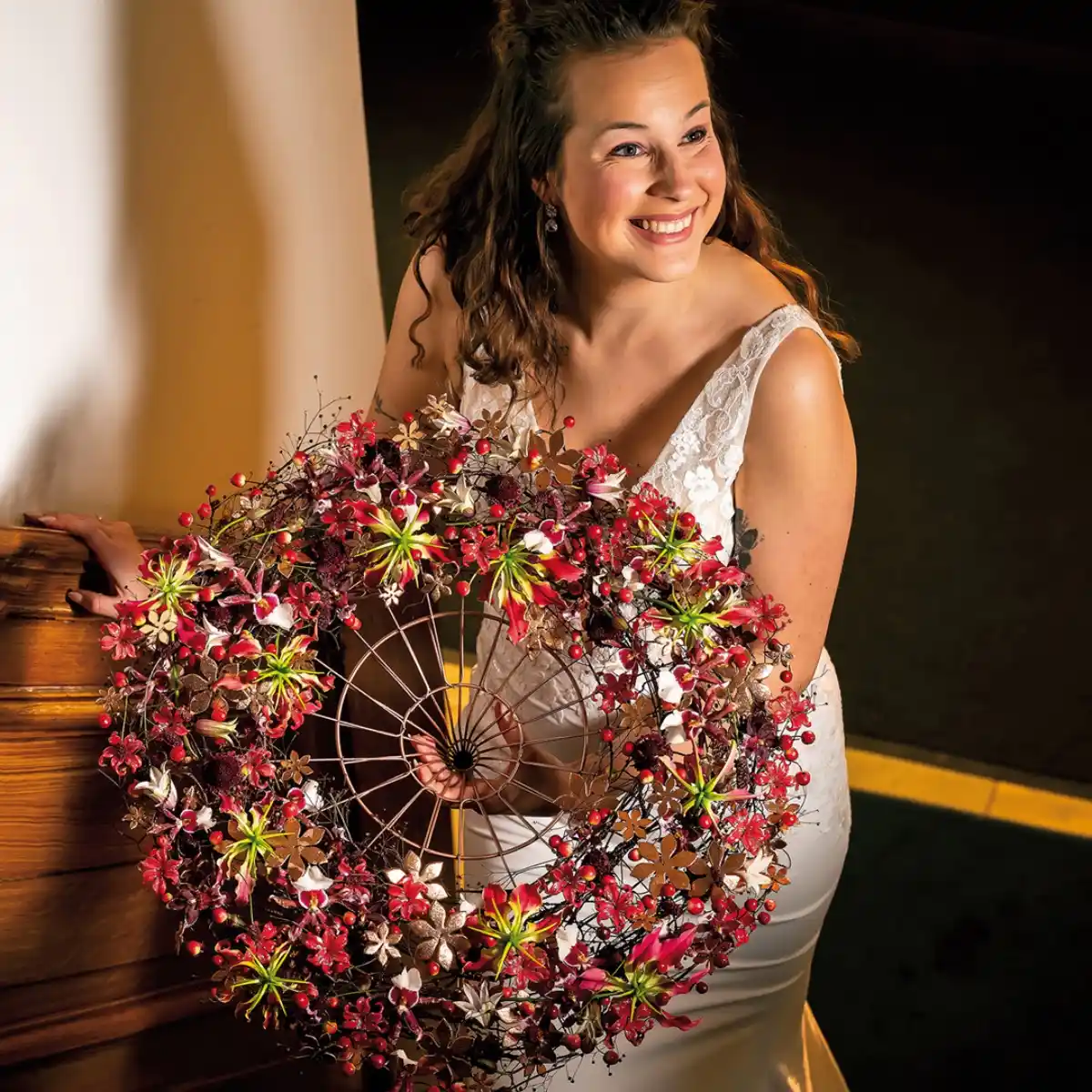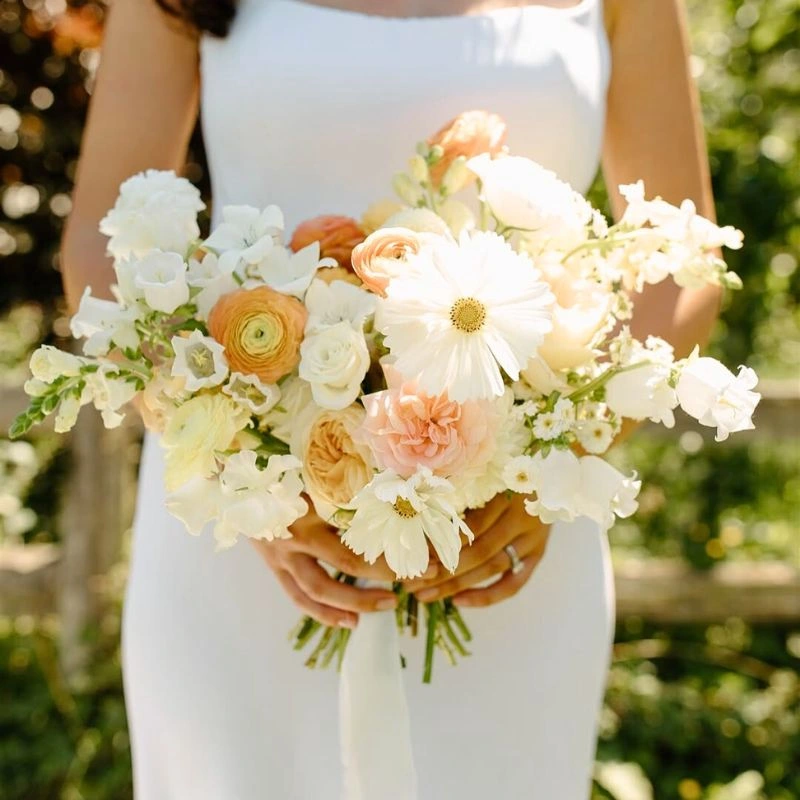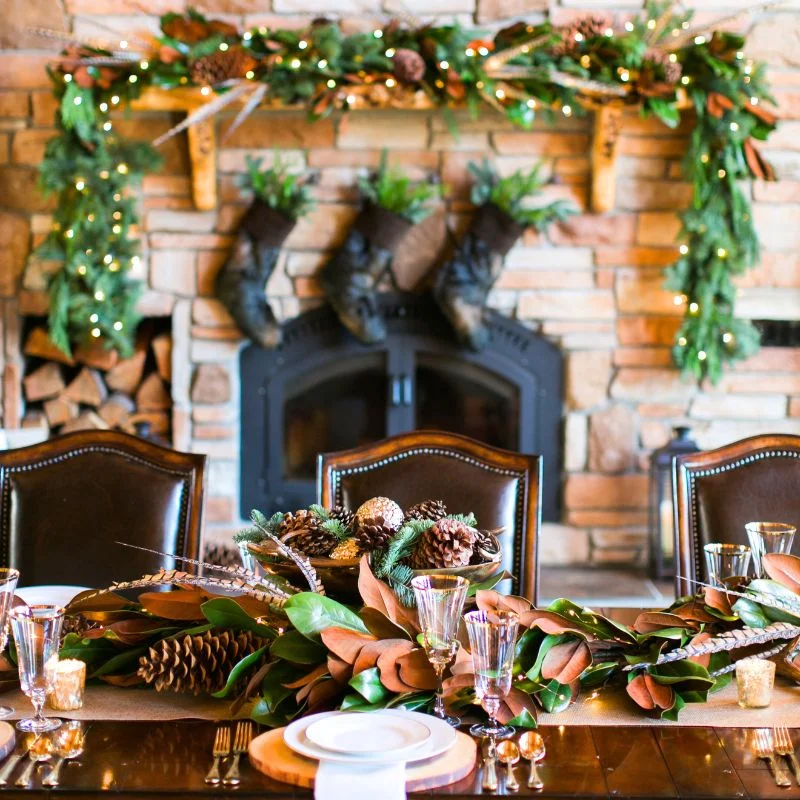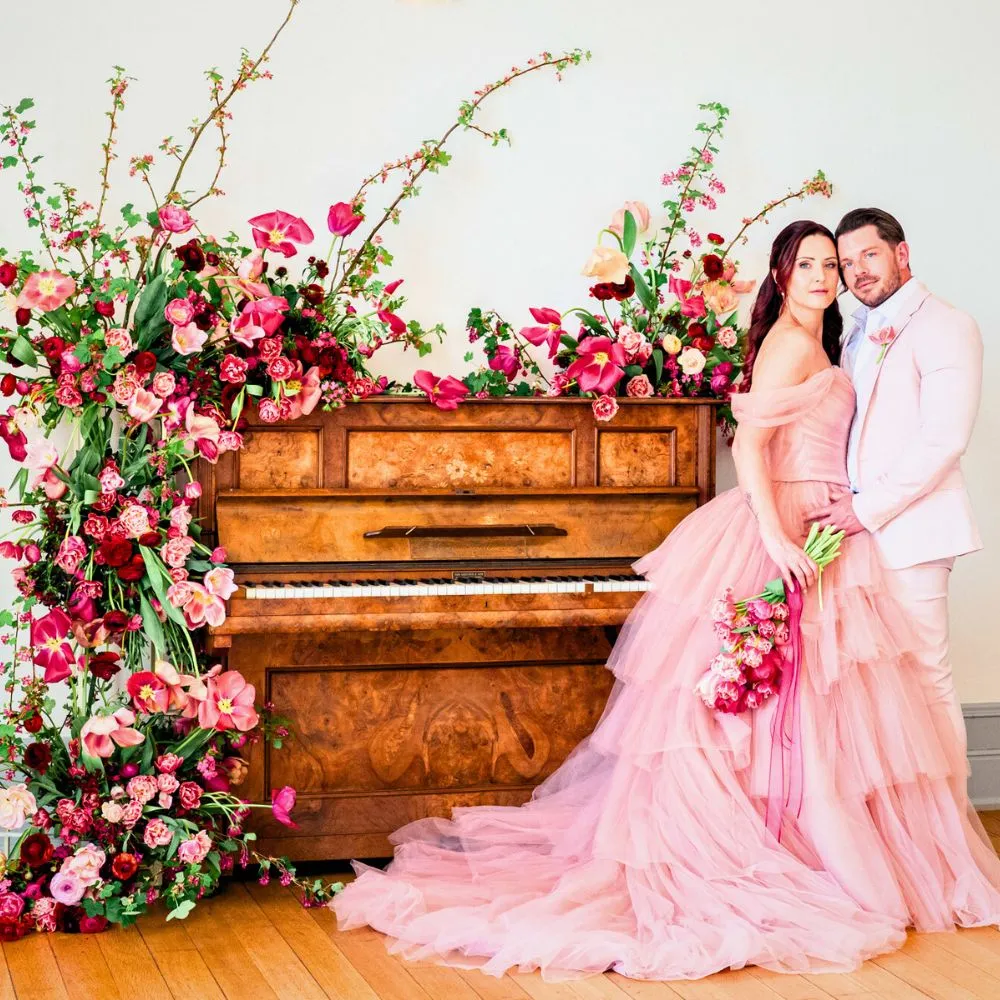Indian garlands, also called varmala are a staple of every Indian festivity and celebration, steeped deeply in Indian culture and tradition. Whether you are creating a garland for a wedding ceremony (the 'varmala') or using it as a decorative piece for a festive occasion, it requires an understanding of tradition, artistry, culture, and personal expression.
Discover the intricate curves and bends needed to master the art of making an Indian garland, and appreciate the rich cultural heritage they represent.
Significance of Garlands in Indian Weddings - Varmala
The varmala ceremony, also known as the Jaimala ceremony, in the context of a Hindu wedding, represents the union and acceptance of both the bride and groom. This wedding ritual involves the exchange of floral garlands, symbolizing their mutual consent and the beginning of their marital journey.
This ceremony not only acknowledges their acceptance of each other but also invites divine blessings for their union, with the act itself denoting respect, love, and commitment. The flowers chosen for designing the varmala are equally significant, with each carrying a different meaning and enhancing the significance of this moment in Indian culture.

Types of Garlands in Various Indian Wedding Traditions
The type of wedding garland for Indian weddings can vary significantly based on regional traditions and cultural practices.
In North Indian weddings, colorful garlands made of roses, marigolds, and jasmine are commonly used, reflecting the region's vibrant culture and festive spirit. These garlands are often adorned with decorative elements like beads, pearls, and ribbons, adding to their visual splendor.

South Indian weddings, on the other hand, often feature garlands made of jasmine, lotus, firecracker flowers (kanakambara), and tulsi (holy basil). These flowers are chosen not only for their beauty but also for their spiritual significance.
Jasmine and lotus are revered for their purity and divine connotations, while tulsi is considered sacred and believed to bring blessings and protection to the couple.
In East India, particularly at Bengali weddings, red and white roses are commonly used to create these handcrafted wedding garlands.

Additionally, marigolds and tuberoses are often incorporated into the garlands, adding layers of fragrance and meaning. The lotus, a symbol of purity and spiritual enlightenment, is also favored in Bengali weddings, making the garland a true reflection of the region's traditions.
A Guide to Choosing the Right Flowers for Your Indian Garland
Choosing the right flowers for your Indian handcrafted garland is crucial for creating a perfect and lasting piece.
Each flower carries its own meaning and symbolism, adding depth and significance to the garland. Whether it’s for a wedding ceremony or a festive occasion, the flowers you select will reflect the traditions and emotions of the event.
Captivating Rose Varmala Designs for Wedding Celebrations
Rose varmalas, with their timeless elegance and deep romantic connection, are a classic choice for a Hindu wedding ceremony. Their rich, velvety petals symbolize love and passion.

When designing a rose varmala, consider using a combination of fully bloomed roses and rosebuds to add texture and depth. Incorporate white flowers such as jasmine or white roses to highlight the design, and add greenery like leaves or baby's breath.
One popular design is the alternating rose pattern, where bunches of red roses are interspersed with white or pink roses, creating a visually appealing contrast. Another exquisite design involves layering petals to form a fuller, more luxurious garland.
Adding elements like beads, pearls, or even small pieces of artificial jewelry can further enhance the elegance of the rose varmala.
This combination perfectly blends tradition and modernity, complementing the bridal attire and standing as a beautiful centerpiece during the varmala ceremony on the wedding day.

Exotic Orchid Flower Varmalas
Orchids, with their unique shapes and vibrant colors, create a stunning visual impact and add a touch of sophistication and exotic beauty to the ceremony.
When designing an orchid varmala for a wedding, you can choose from a wide range of colors, including white, pink, purple, and even vibrant blues. A single color scheme can create a cohesive and elegant look.
White orchids are perfect for a minimalist, elegant style, while purple and pink orchids can add a pop of color and a touch of luxury. These flowers suit both traditional and modern wedding themes, making them a versatile choice for any Hindu wedding.
Other Popular Flowers to Make Your Indian Garland
-
Marigold Garlands: Marigolds are traditionally used in Indian weddings for their bright colors and cultural significance. They are believed to bring good luck and ward off evil spirits. Marigold varmalas are often used in South and East Indian wedding traditions, adding a vibrant touch to the ceremony.

-
Jasmine Garlands: Jasmine garlands are a common sight in South Indian weddings, often paired with marigolds and other flowers like roses to create a beautiful, contrasting visual. Their sweet scent adds an aromatic ambiance to the wedding venue, enhancing the overall experience for both the bride and groom.
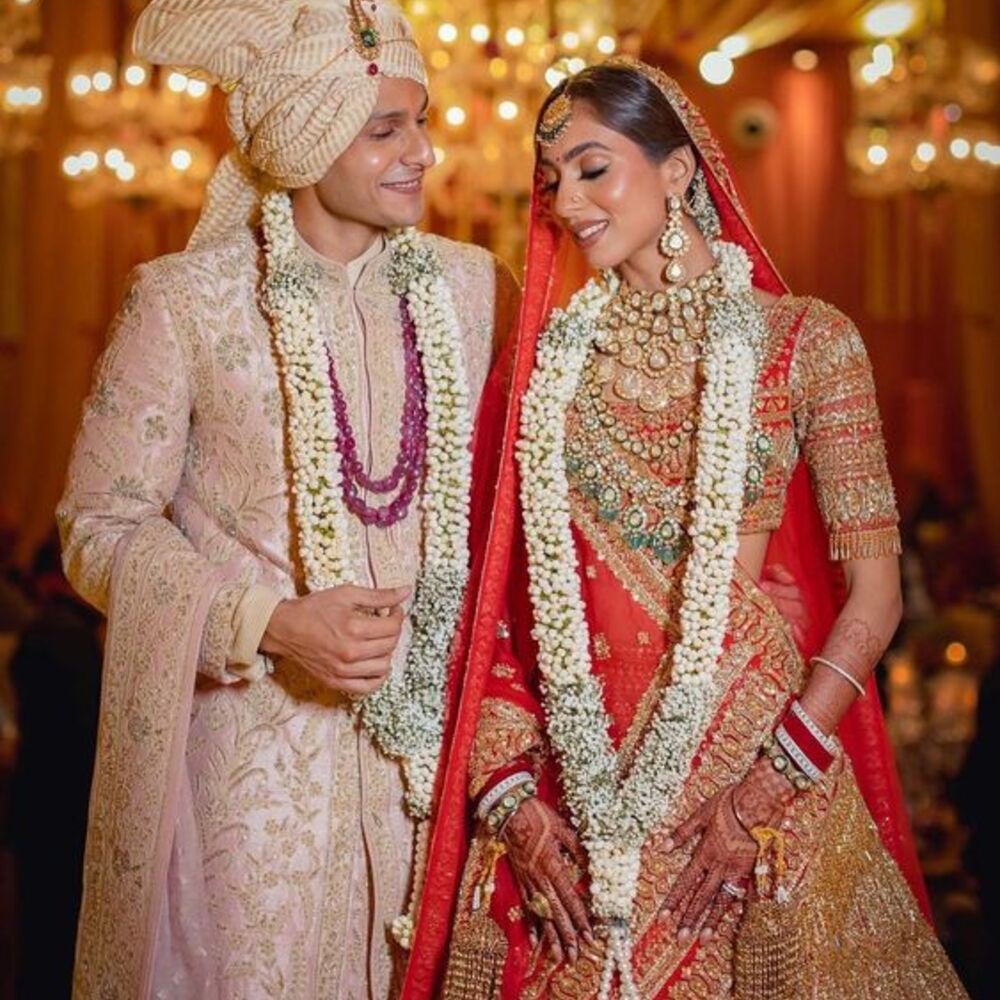
-
Chrysanthemum Garlands: Chrysanthemums, available in a variety of colors, symbolize joy and longevity. They are often used in combination with other flowers to add volume and color diversity to the garland. Chrysanthemum garlands are versatile and can be tailored to suit different wedding themes and preferences, making them a popular choice for Indian weddings.
In addition to these, garlands made from tulsi (holy basil) hold special significance in certain South Indian communities, symbolizing purity and divine blessing. These flowers are an integral part of the rituals and traditions, adding spiritual depth to the marriage ceremony.
Essential Materials for Crafting an Enchanting Indian Flower Garland
Creating an exquisite Indian garland requires a thoughtful selection of materials to ensure both beauty and durability.
The key ingredients include the very obvious—fresh flowers, which can range from wild roses, jasmine, marigolds, chrysanthemums, and carnations.
Additionally, you'll need a sturdy string or thread, a big needle for threading the flowers, and decorative elements such as beads, pearls, and mango leaves to add more color.
Essential tools like scissors and pruning shears are necessary for the cutting tasks. It's also recommended to be prepared with storage, transportation, and maintenance measures, such as a spritzer, floral preservatives, and breathable containers for convenient transport, especially if needed for a wedding ceremony.
Mango leaves are often included in garlands used in Hindu weddings or auspicious rituals, as they are believed to bring purity and ward off negativity. Including mango leaves can add cultural and spiritual significance to your garland, making it a perfect addition to any ceremony or ritual.
Methods and Tips for Crafting Simple Hindu Wedding Garlands
Creating a simple garland for ceremonies involves a blend of thoughtful flower selection and easy-to-follow techniques. Start by selecting durable flowers for the garland, ensuring they are beautiful and capable of lasting the ceremony.
Carnations, roses, chrysanthemums, jasmine, and marigolds are excellent choices. Trim the stems to a uniform length and remove any excess leaves or thorns. To begin assembly, thread a strong needle with durable string or floral wire.
Pierce the flowers at the base and thread them onto the string, ensuring they are packed tightly to create a full appearance. Using alternating colors or types of flowers to create a pattern adds visual interest and makes the garland look more intricate.

Handle the flowers gently to avoid bruising or damaging the petals. Finally, secure the ends of the garland with knots and add any final touches, such as ribbons or additional decorative elements, ensuring it suits the wedding ceremony’s aesthetic.
Preparing Your Flowers for a Perfect Rose Garland
The first step in creating a stunning rose garland for a Hindu wedding is selecting fresh, high-quality roses. Look for flowers with healthy petals, sturdy stems, and no blemishes.
Choose flowers that are slightly open but not fully bloomed, as they will last longer and maintain their shape better. Once you have your roses, trim the stems to a minimal length (less than half an inch). Remove any thorns or leaves that may interfere with your garland's creation.
Inspect each flower, gently removing any damaged or wilted petals to ensure only the best flowers are used. Rinse the flowers gently under cool water to remove any dirt or pesticides and to hydrate them, ensuring they remain fresh throughout the garland-making process.
Let the roses air dry on a clean towel. This careful preparation ensures that your roses are in the best possible condition for garland making, contributing to a beautiful and durable final product suitable for the varmala ceremony.
Techniques for Assembling a Gorgeous Rose Varmala
Assembling a rose varmala involves a series of precise techniques to ensure the garland is both beautiful and durable. Begin by threading a strong needle with a durable string long enough to accommodate the desired length of your garland.
Start stringing the roses by piercing through the base of each flower, carefully threading them in a consistent direction.

Periodically check the garland's length and adjust the spacing as needed to maintain uniformity. Once the desired length is achieved, secure the ends with knots and add any final decorative touches. Your rose varmala is now ready for the wedding ceremony.
This method ensures that the garland will hold up well during the rituals and exchange, symbolizing the acceptance and union of the bride and groom in a traditional Hindu wedding ceremony.
Some Expert Tips for Maintaining and Preserving Your Garland
Ensuring that your garland remains fresh and vibrant throughout the wedding ceremony and beyond requires some careful attention and practical steps. Here are expert tips for maintaining and preserving your garland.
By following these simple tips and guidelines, you can keep your garland looking beautiful and even preserve it as a cherished keepsake. From hydration techniques to proper storage, these tips will help you enjoy the beauty of your garland for a longer time.
Best Practices for Varmala Longevity
Here are some tips and best practices that you can follow to keep your varmala flowers and garlands, fresh and beautiful throughout the special day:
-
Select Fresh Flowers: Choose flowers that are freshly picked and in good condition with slightly, but not fully opened flowers to ensure they last longer.
-
Hydrate the Flowers: Before assembling the garland, soak them in water to hydrate the petals and keep them looking fresh. These additives provide essential nutrients and help extend the life of the flowers.
-
Cool Storage: Store the flowers in a cool, shaded place before assembling the garland. Avoid direct sunlight and heat, as they can cause the flowers to wilt prematurely. If possible, use a floral cooler or refrigerator set at an optimal temperature of around 2°C to 3°C (36°F to 38°F).
-
Use Floral Spray: Consider using a floral spray designed to keep flowers fresh. These sprays create a protective barrier on the petals, helping to lock in moisture.
-
Assembly Timing: Assemble the garland as close to the event time as possible. The shorter the time between assembly and use, the fresher the garland will appear.
-
Mist Regularly: Once the garland is assembled, mist it regularly with water to keep the flowers hydrated. Be careful not to overdo it though, as excess water can cause the flowers to rot.
-
Avoid Excessive Handling: Handle the garland gently to avoid bruising or damaging the flowers. The less the flowers are handled, the longer they will stay fresh.
-
Transport with Care: If you need to transport the garland, place it in a breathable container and keep it cool. Avoid placing it in the trunk of a car where temperatures can rise quickly.
Methods to Preserve Your Wedding Varmala
Preserving your wedding varmala allows you to keep a cherished memento of your special day. Here are some methods and creative ways to preserve your garland:
-
Air Drying: One of the simplest methods is air drying. Hang the garland upside down in a cool, dry place with good air circulation. This method takes a few weeks but preserves the flowers' natural shape and color.
-
Pressing: For a more compact keepsake, consider pressing the flowers. Place individual flowers or small sections of the garland between parchment paper and press them under heavy books or in a flower press. Once dried, these pressed flowers can be framed or used in scrapbooks.
-
Silica Gel: For a more vibrant preservation, use silica gel. Bury the flowers in silica gel crystals, which absorb moisture and preserve the flowers' colors and shape. This method is particularly effective for delicate flowers like orchids.
-
Resin Encapsulation: Create a lasting keepsake by encapsulating sections of the garland in resin. This technique preserves the flower in a clear, durable medium that can be fashioned into decorative items like paperweights, jewelry, or framed art.
-
Creating a Shadow Box: Preserve your garland in a shadow box display. Arrange the dried or pressed flowers in a shadow box frame along with other wedding memorabilia such as invitations, photos, or small trinkets to create a personalized keepsake that you can display in your home.
-
Floral Art: Turn your preserved flowers into artwork by mounting them on canvas or using them in mixed media art projects. This creative approach allows you to display your wedding memories in a unique and personal way.

Creativity with Exquisite Varmala and Indian Garland Designs
Creating a beautiful varmala is an art that combines tradition, creativity, and personal expression. From selecting the right flowers to mastering the techniques of garland making, each step allows you to craft a piece that is uniquely yours.
Experiment with different flowers, colors, and decorative elements to design a garland that reflects your personality and the theme of your wedding. Remember, the key to a stunning garland lies in attention to detail and a passion for the art of floral arrangement.
Embrace this creative journey and enjoy the process of bringing your vision to life. Your varmala will be not only a beautiful adornment but also a meaningful symbol of your love and commitment, cherished for years to come.

.jpg)
